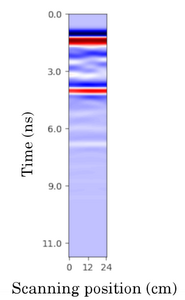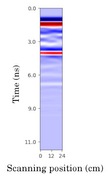Information
- Publication Type: Journal Paper (without talk)
- Workgroup(s)/Project(s):
- Date: October 2022
- DOI: 10.3390/rs14195038
- ISSN: 2072-4292
- Journal: Remote Sensing
- Number: 19
- Open Access: yes
- Pages: 12
- Volume: 14
- Event: Radar Techniques for Structures Characterization and Monitoring
- Publisher: MDPI
- Pages: 5038 –
- Keywords: deep learning, ground-penetrating radar, non-destructive-evaluation
Abstract
Assessing the structure of a building with non-invasive methods is an important problem. One of the possible approaches is to use GeoRadar to examine wall structures by analyzing the data obtained from the scans. However, so far, the obtained data have to be assessed manually, relying on the experience of the user in interpreting GPR radargrams. We propose a data-driven approach to evaluate the material composition of a wall from its GPR radargrams. In order to generate training data, we use gprMax to model the scanning process. Using simulation data, we use a convolutional neural network to predict the thicknesses and dielectric properties of walls per layer. We evaluate the generalization abilities of the trained model on the data collected from real buildings.Additional Files and Images
Weblinks
- https://www.mdpi.com/2072-4292/14/19/5038
- Entry in reposiTUm (TU Wien Publication Database)
- DOI: 10.3390/rs14195038
BibTeX
@article{gilmutdinov-2022-aomlbwug,
title = "Assessment of Material Layers in Building Walls Using
GeoRadar",
author = "Ildar Gilmutdinov and Ingrid Schl\"{o}gel and Alois
Hinterleitner and Peter Wonka and Michael Wimmer",
year = "2022",
abstract = "Assessing the structure of a building with non-invasive
methods is an important problem. One of the possible
approaches is to use GeoRadar to examine wall structures by
analyzing the data obtained from the scans. However, so far,
the obtained data have to be assessed manually, relying on
the experience of the user in interpreting GPR radargrams.
We propose a data-driven approach to evaluate the material
composition of a wall from its GPR radargrams. In order to
generate training data, we use gprMax to model the scanning
process. Using simulation data, we use a convolutional
neural network to predict the thicknesses and dielectric
properties of walls per layer. We evaluate the
generalization abilities of the trained model on the data
collected from real buildings.",
month = oct,
doi = "10.3390/rs14195038",
issn = "2072-4292",
journal = "Remote Sensing",
number = "19",
pages = "12",
volume = "14",
event = "Radar Techniques for Structures Characterization and
Monitoring",
publisher = "MDPI",
pages = "5038--",
keywords = "deep learning, ground-penetrating radar,
non-destructive-evaluation",
URL = "https://www.cg.tuwien.ac.at/research/publications/2022/gilmutdinov-2022-aomlbwug/",
}


 paper
paper
